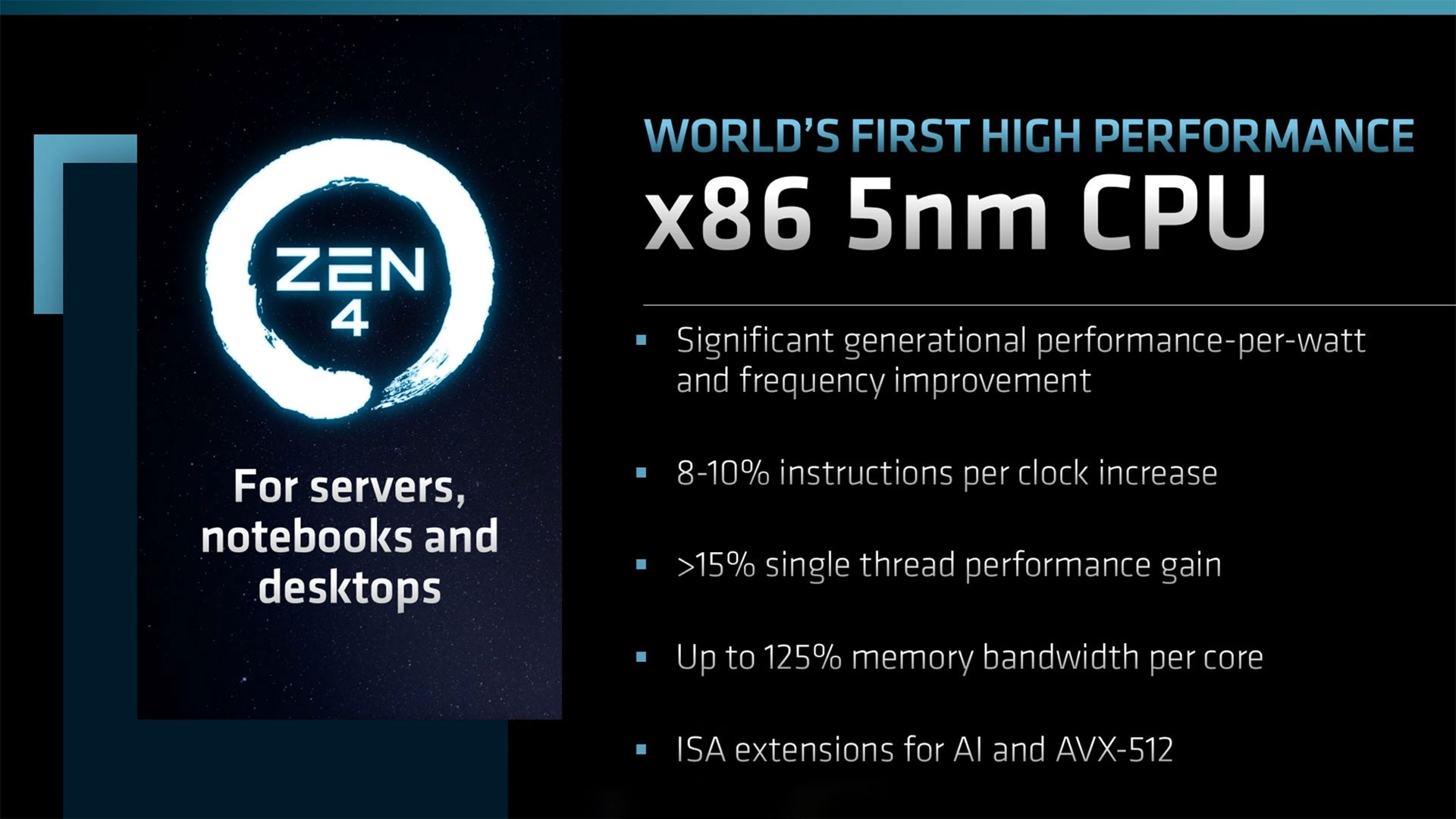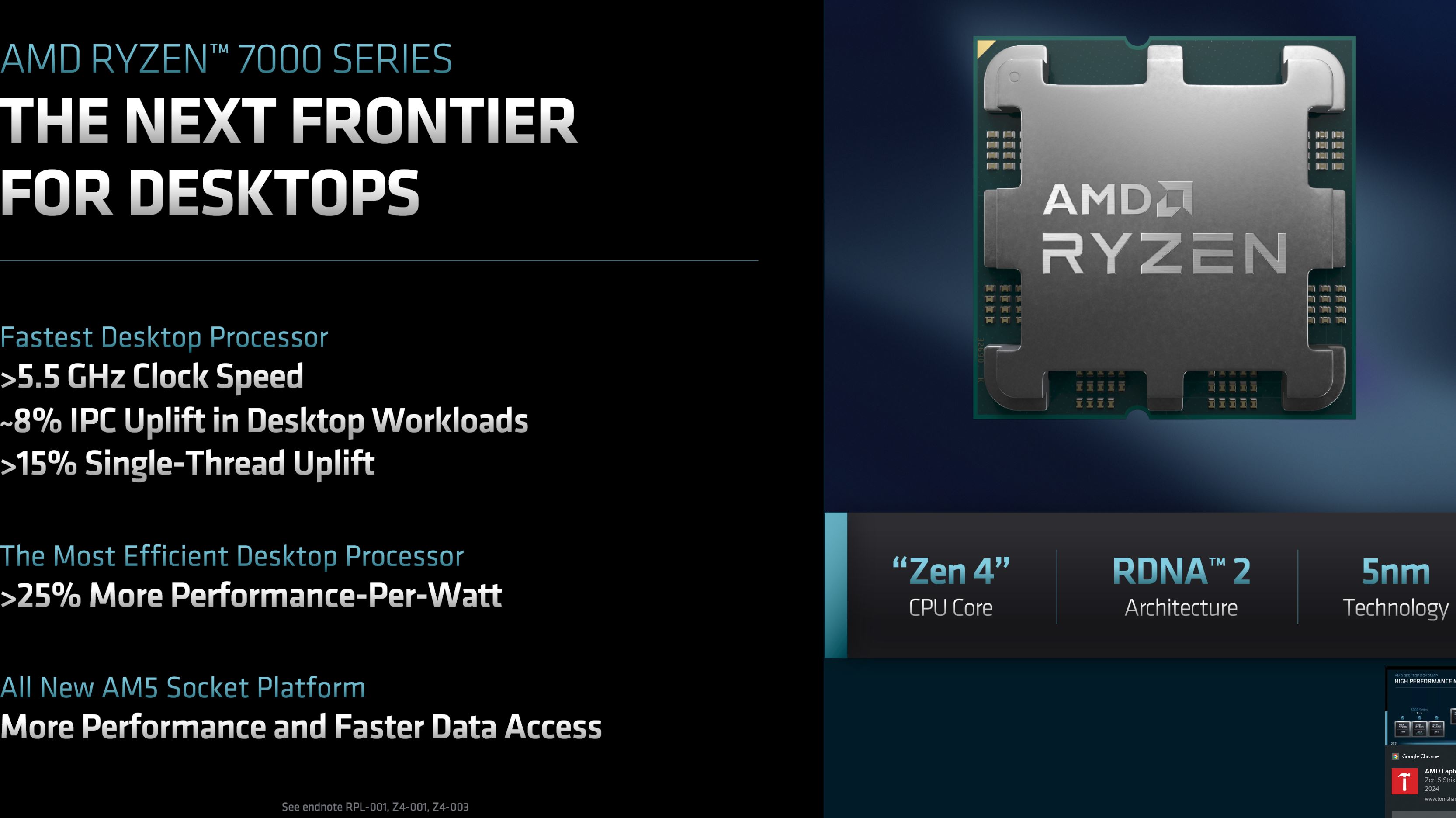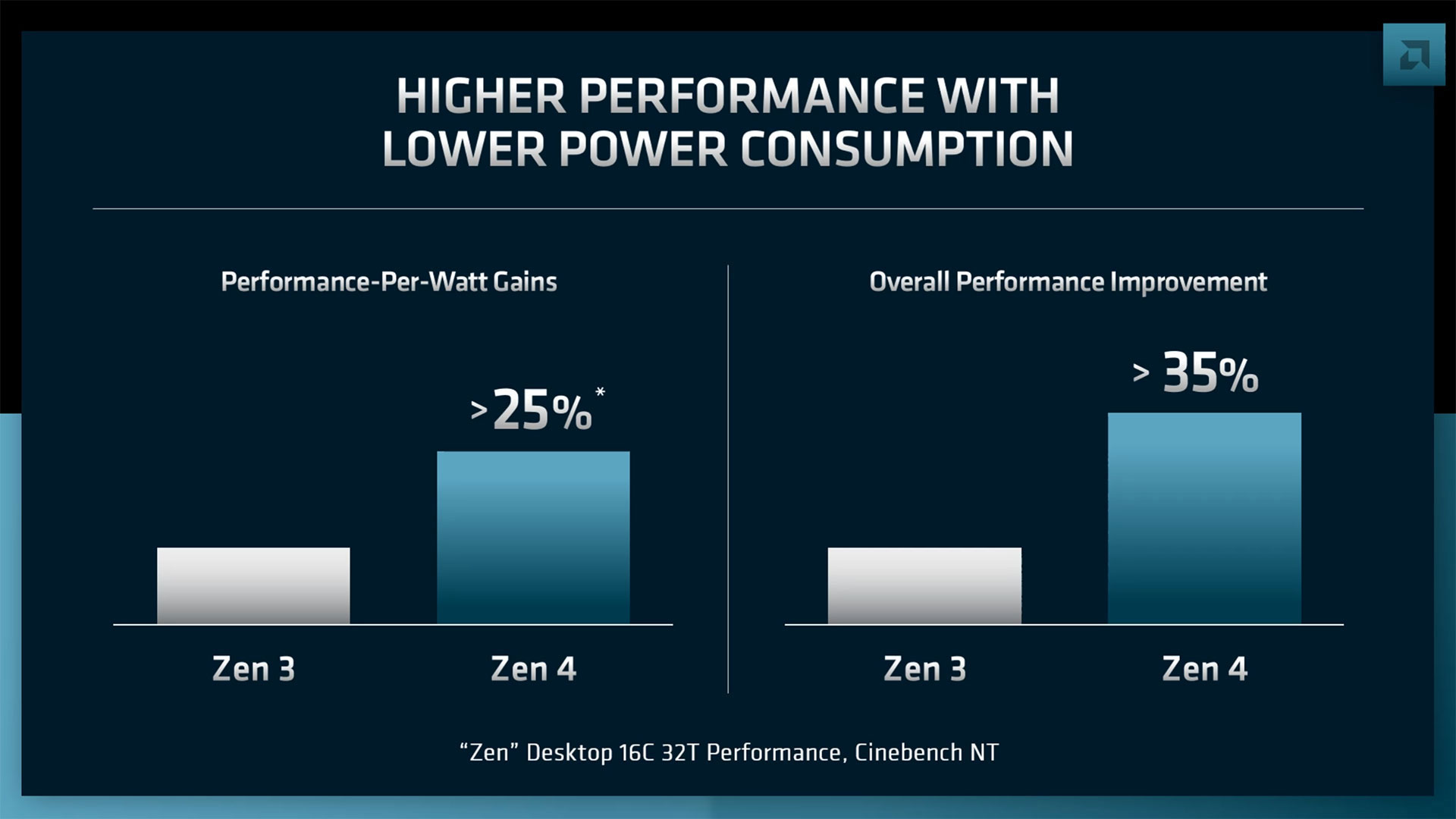AMD Zen 4 Ryzen 7000 Has 8–10% IPC Uplift, More than 35% Overall Performance Gain
>25% performance-per-watt gains, too
AMD CEO Lisa Su’s Zen 4 teaser of the Ryzen 7000 processors at Computex 2022 was impressive, but the news that the processors would feature ‘only’ a >15% improvement in single-threaded performance left some enthusiasts feeling a bit underwhelmed. During today’s Financial Analyst Day 2022, AMD clarified that it is targeting an 8 to 10% increase in IPC for the Zen 4 processors and that the company is targeting larger gains in single-threaded performance in some types of workloads.
AMD also clarified that Zen 4 processors would have >25% performance-per-watt and >35% overall performance improvements. The company says the Zen 4 chips will also have significant clock frequency improvements, which isn’t surprising given that it has already demoed a Ryzen 7000 processor running at 5.5 GHz on all cores (albeit not with all cores under load). Zen 4 will also have up to a 25% increase in memory bandwidth per core. AMD also made several other announcements today, which you can find listed at the end of the article.
AMD’s Zen 4 disclosures today help clarify the company’s performance targets after the initial reveal. AMD’s original projections of a >15% improvement in single-threaded work led to some consternation because single-threaded performance comes as a combination of both frequency and the all-important IPC (instruction per cycle) throughput, and the relatively low single-threaded performance threshold didn’t seem to leave much room for IPC improvement. However, AMD’s clarification that the IPC gain will range from 8 to 10%, dependent upon workload, is a bit more encouraging.
Whip in the company’s claims of significant frequency improvements for the 5nm Zen 4 processors, and we should see much larger gains than the baseline 15% gain in single-threaded performance in some types of workloads — remember, >15% is a “greater than” value.
AMD also shared a slide showing a greater than 25% performance-per-watt and greater than 35% gain in overall performance in a multi-threaded Cinebench benchmark. This benchmark used a 16-core 32-thread Ryzen 7000 desktop PC processor against the 16-core Zen 3 Ryzen 9 5950X. The slide is a bit misleading as it uses a non-zero axis that amplifies the gain, so keep that in mind.
The Zen 4 processors will also support up to 25% more memory bandwidth per core, a marked increase that comes from both the step up to DDR5 and likely from widened pathways in the chip to deliver additional bandwidth to the cores. That will provide quite the uplift for the bandwidth-hungry AVX-512 extensions that AMD added for Zen 4. AMD isn’t sharing any new architectural details yet, so we’ll have to wait to learn more. Here's the rest of our coverage from today:
- AMD CPU Core Roadmap, 3nm Zen 5 by 2024, 4th-Gen Infinity Architecture
- AMD GPU Roadmap: RDNA 3 With 5nm GPU Chiplets Coming This Year
- AMD CDNA 3 Roadmap: MI300 APU With 5X Performance/Watt
- AMD’s Data Center Roadmap: EPYC Genoa-X, Siena, and Turin
- AMD Laptop, Desktop Roadmap: Zen 5 Strix Point, Granite Ridge in 2024
Get Tom's Hardware's best news and in-depth reviews, straight to your inbox.

Paul Alcorn is the Editor-in-Chief for Tom's Hardware US. He also writes news and reviews on CPUs, storage, and enterprise hardware.
-
-Fran- Two quick corrections:Reply
(...)this is an “up to or greater than” value.
That should be just "greater than". It is completely opposite from "up to". You could even phrase it as "from or greater than". The "up to" statements are "<=".
(...)it has already demoed a Ryzen 7000 processor running at 5.5 GHz on all cores.
Careful there, as they haven't. They showed a game which we can safely assume it is not loading all cores and they've gone on record saying they'll be hitting above 5Ghz all-core, but haven't said where the speed will land. I hope it is indeed 5.5Ghz, but I doubt it. I'll be more than happy to be wrong. Still, they haven't demoed it.
Regards. -
Paul Alcorn Reply-Fran- said:Two quick corrections:
That should be just "greater than". It is completely opposite from "up to". You could even phrase it as "from or greater than". The "up to" statements are "<=".
Careful there, as they haven't. They showed a game which we can safely assume it is not loading all cores and they've gone on record saying they'll be hitting above 5Ghz all-core, but haven't said where the speed will land. I hope it is indeed 5.5Ghz, but I doubt it. I'll be more than happy to be wrong. Still, they haven't demoed it.
Regards.
Good eye on the first point. Thx. On the second, AMD has since specified that it was 5.5 GHz on all cores. They certainly didn't say those cores were all under load, of course...so we won't see that at all-core loads (of course). -
-Fran- Reply
No problem!PaulAlcorn said:Good eye on the first point. Thx. On the second, AMD has since specified that it was 5.5 GHz on all cores. They certainly didn't say those cores were all under load, of course...so we won't see that at all-core loads (of course).
Are you sure they've demoed it though? That was my nitpick. If they've mentioned it, I guess that's good, but we haven't seen anything like the game they ran showing real time clocks. Right?
Regards. -
Alvar "Miles" Udell ReplyAMD CEO Lisa Su’s Zen 4 teaser of the Ryzen 7000 processors at Computex 2022 was impressive, but the news that the processors would feature ‘only’ a >15% improvement in single-threaded performance left some enthusiasts feeling a bit underwhelmed. During today’s Financial Analyst Day 2022, AMD clarified that it is targeting an 8 to 10% increase in IPC for the Zen 4 processors and that the company is targeting larger gains in single-threaded performance in some types of workloads.
I would think that enthusiasts are still pretty underwhelmed, I know I still am. 8-10% IPC is the lowest AMD has delivered since the node shrink optimization Zen+, nothing like the gains from Zen-Zen2-Zen3 have been, and could very well leave themselves open to falling well behind Intel. -
-Fran- Reply
Keep expectations in check as well. They are delivering a monstrous speed increase at the same time as increasing IPC, unlike Phenom to Bulldozer, so there's nothing to be underwhelmed about yet, specially with no official benchmarks. It's good to be demanding for sure (I know I am), but give AMD the benefit of the doubt on this one. At the end of the day what matters more is the performance you get out of the CPU as whole and not the individual nitpicks.Alvar Miles Udell said:I would think that enthusiasts are still pretty underwhelmed, I know I still am. 8-10% IPC is the lowest AMD has delivered since the node shrink optimization Zen+, nothing like the gains from Zen-Zen2-Zen3 have been, and could very well leave themselves open to falling well behind Intel.
That being said, it is sad to see they went for clocks and not more IPC like before, so I can totally understand.
Regards. -
BeedooX Reply
Why would it be underwhelming? IPC is just one performance metric. IPC is just that; how many 'clocks' is another thing. If a 5950X tops out around 5GHz (lightly threaded), and Zen 4 tops out around 5.5GHz gaming (I've seen reports of 5.6 or 5.7), then there's at least 10% more performance overall.... then we all know Zen 3 drops clock speed quite a bit when all cores are pushed; Zen 4 is better at pushing clocks over one core (as previously stated with all cores over 5GHz).Alvar Miles Udell said:I would think that enthusiasts are still pretty underwhelmed, I know I still am. 8-10% IPC is the lowest AMD has delivered since the node shrink optimization Zen+, nothing like the gains from Zen-Zen2-Zen3 have been, and could very well leave themselves open to falling well behind Intel.
And look, if AMD can't match or beat Intel this time around, then perhaps y'all can look forward to some cheaper CPU's again. -
ern88 Looks like AMD zeroed in on all core speeds and a tweak to IPC. More less. The performance should be nice. Have to wait and see what Intel has planned next release.Reply -
escksu Reply-Fran- said:Two quick corrections:
That should be just "greater than". It is completely opposite from "up to". You could even phrase it as "from or greater than". The "up to" statements are "<=".
Careful there, as they haven't. They showed a game which we can safely assume it is not loading all cores and they've gone on record saying they'll be hitting above 5Ghz all-core, but haven't said where the speed will land. I hope it is indeed 5.5Ghz, but I doubt it. I'll be more than happy to be wrong. Still, they haven't demoed it.
Regards.
Yup, we all know the usual marketing tactics.
If the CPU can run at 5.5GHz on all cores, single core performance will be higher than this and we will see AMD quoting higher clocks instead.
Things are also alot more complicated now. We are no longer in the days where CPU run at fix clock and fix voltage. Now it varies widely according to load and power/thermal limits. -
spongiemaster Reply
What exactly are the bars here supposed to represent? They just chose two random sized bars and then put a number on top of one of them. It makes no sense to present this data in this format. AMD is absolutely not the only company to do things like this, and all of them need to stop it.
If 35% overall performance improvement is real, there is certainly nothing to complain about here. Though, I have the feeling that will only be the case if you limit yourself to 32 thread capable applications. The real world performance which rarely loads that many threads is going to be lower. If they can hit 25% on average with the 8 core version that will still be great, and easily something worth upgrading to.


